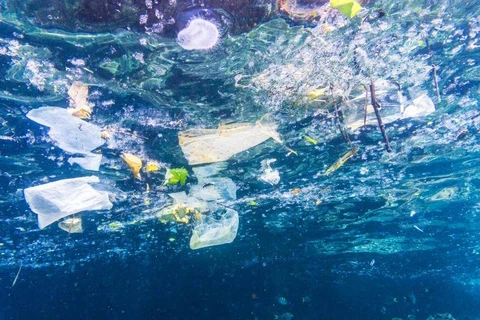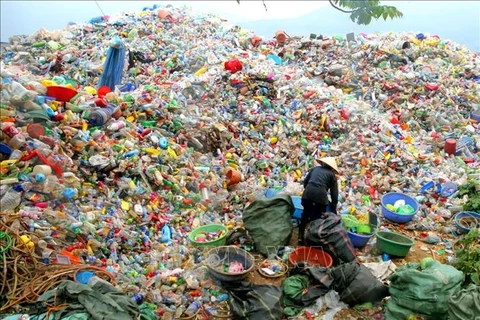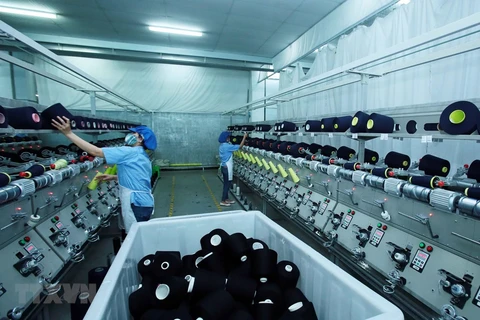 Deputy Minister of Planning and Investment Tran Quoc Phuong speaks at a forum on Circular Economy development in Vietnam on October 23. (Photo: VNA)
Deputy Minister of Planning and Investment Tran Quoc Phuong speaks at a forum on Circular Economy development in Vietnam on October 23. (Photo: VNA) Hanoi (VNS/VNA) - A circular economy is the future of every nation’s economy, of all production and business activities. It is the key for rapid and sustainable development, participants heard at a recent forum, entitled “Circular Economy: Direction for Sustainable Businesses in Vietnam”.
Speaking at the event in Hanoi, Deputy Minister of Planning and Investment Tran Quoc Phuong said that the development of a circular economy has gradually become a trend among nations, especially developed countries with few resources and when the world's resources are increasingly becoming depleted.
“Vietnam has faced an increasing amount of generated waste while raw materials and fossil fuels are increasingly exhausted. In addition, most Vietnamese businesses have outdated technology, small production scale and lack of resources to invest in recycling,” said Phuong.
Therefore, Phuong said, implementing a circular economic model will help Vietnamese enterprises achieve their sustainable production and consumption goals.
“Following a circular economy for Vietnam is an inevitable requirement to overcome the limitations of the traditional growth model. Circular economic development helps Vietnam avoid depending on the outside economy, especially for raw materials and fuels for production,” stressed Phuong.
“The transition to a circular economy is a great opportunity for Vietnam to develop rapidly and sustainably, not only achieving its economic, social, environmental, and climate change responses, but also helping to achieve goals of the 2030 Agenda for Sustainable Development,” added Phuong.
At the forum, delegates exchanged knowledge and shared experience for businesses in the implementation of initiatives and business models related to the circular economy such as: measures to help businesses develop sustainably; opportunities and challenges for circular economic development in Vietnam; eco-industrial parks - an efficient model of the circular economy; and cyclic model in a company’s sustainable development strategy.
General Secretary of the Vietnam Chamber of Commerce and Industry (VCCI) Nguyen Quang Vinh said that the circular economy was a new model, but was very effective and suitable for all economies. In which, the awareness of environmental protection should go hand in hand with practical actions to protect the environment in the process of rapid and sustainable growth of economic activities.
Former Director of the Institute of Natural Resources and Environmental Policy and Strategy Nguyen The Chinh said that the circular economy should go along with technological innovation and design.
“Circular economy requires coordination, sharing and linking stakeholders. It also requires a team of good experts and the classification and cleaning of waste before being reused and recycled,” Chinh said.
To develop the circular economy in Vietnam, Chinh said, priorities should be given to promulgate a clear legal corridor and to conduct extensive research. The development of the circular economy needs to be based on sectors, fields and localities and create mechanisms to form market dynamics.
“It is necessary to implement circular economic development with a roadmap and priorities and increase exchange and learn from international experiences, combining high technology and the fourth industrial revolution. And an issue that is needed to be solved immediately for Vietnam is to sort waste at source,” added Chinh.
The event is a multidimensional forum for policy makers, representatives of businesses, experts, researchers to exchange, discuss and make recommendations to solve current problems and to promote the development of a circular economy in Vietnam.
Le Thi Ngoc My, Head of Sustainability at Heineken Vietnam, said that climate change was one of the most serious threats to Vietnam. The company has applied the circular economy model wherever possible to have a positive impact on the environment.
My said that Heineken Vietnam now used renewable thermal energy at five out of six of its breweries. When the company switched to clean biomass energy to brew, the company was able to source approximately 40,000 tonnes of agricultural waste, which also generated 52.6 billion VND for local farmers in 2019. This initiative reinforces that it is not only good for the environment and local community but also beneficial to the business.
According to UNIDO, circular economy is an economic model in which all activities from design, production to service delivery move towards reusing matter and eliminating negative environmental impacts. Circular economy brings four basic benefits through taking advantage of resources, including: saving resources, protecting the environment, promoting economic development, and social benefits./.
VNA























